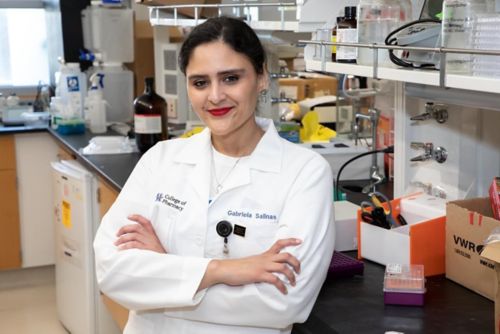Tips for Childhood Cancer Survivors on Staying Financially Fit
Read this post in Spanish, Portuguese, and French.

Financial woes are a common late effect of childhood and adolescent cancer. But there are strategies you can follow to stay financially fit.
Gabby Salinas knows about the financial impact of childhood cancer. By her 19th birthday, she had survived cancer 3 times. At age 35, the financial fallout of childhood cancer still shapes her life.
Despite having health insurance, Salinas is years behind in getting a recommended health screening test. She says learning to navigate the approval process for her insurance plan and then finding the right health care provider contributed to the delay.
She is not alone in facing such hurdles.
The financial burden of childhood cancer
As the number of childhood cancer survivors grows worldwide, their finances are getting more attention.
A survey of adult survivors of childhood cancer found they were more likely to have financial stress than their siblings who did not have cancer. Survivors reported being more worried than their siblings when it came to paying medical bills and rent or having enough money to buy healthy meals. They were also more likely to skip needed medical care and be in debt collection. These findings from the Childhood Cancer Survivor Study were published in 2022.
“Financial hardship is a late effect of cancer therapy. Cancer does not end when you get your final chemo or ring the bell,” says Paul Nathan, MD, of the Hospital for Sick Children in Toronto. His research and medical practice focus on childhood cancer survivors. He led the 2022 Childhood Cancer Survivor Study that surveyed survivors about finances.
Nathan says asking survivors about financial health is a key first step. “To solve a problem, we need to identify it,” he says. Efforts are underway to develop financial screening tools. Work has started on creating cost-effective ways to ease survivors’ financial stress.
As that work continues, here are some strategies to try now.
Make a plan
Angie Lenschau is a licensed clinical social worker at St. Jude Children’s Research Hospital. She works with children and teens in the St. Jude After-Completion of Therapy Clinic. The clinic serves patients who have finished treatment and are 5 years from their diagnosis. The survivors are seen annually at the clinic until they reach certain milestones related to their age or cancer history.
“When patients are age 15, I plant a seed about the future, about what they are going to do after high school,” says Lenschau about her interactions with young cancer survivors. “I start talking about health insurance. I phrase it: ‘I know this is a really boring adulting thing, but here’s the deal, you have to have insurance.’”
For some survivors, trade school, community college or university are the paths toward a job and insurance. For those who want to go straight to the workforce, Lenschau stresses the importance of finding a job that provides health insurance.
“I’m like a broken record,” she says. “I ask again at the next visit.”
Think long term
Salinas has health insurance. She lives at home and has avoided student debt. But health care — finding it, paying for it, and getting recommended care — remains a major source of financial stress.

Gabby Salinas is a 3-time cancer survivor, research scientist, and patient advocate.
She was 7 years old when she was diagnosed with Ewing sarcoma. At age 15, she was diagnosed with papillary thyroid cancer. The thyroid cancer returned when she was 18 years old and a high school senior. Her cancer treatment included surgery, radiation, and chemotherapy.
Salinas stayed in her hometown for college and live at home for a year to save money and maintain health insurance through the state’s Medicaid program.
She was interested in becoming a research scientist. But she delayed graduate school for 3 years for financial reasons. She worked and saved so she could pay for health insurance and other medical costs.
“If I was healthy and wanted to go to graduate school, the graduate student stipend would be enough,” she says. “But the student health insurance is just not enough for someone with my history.”
She earned a master’s degree in pharmaceutical sciences. She is working as a project manager for a construction company while she looks for a job in her field.
Salinas buys private health insurance through her state’s health insurance marketplace. She relies on her policy to help pay for recommended health care screenings and to manage the late effects of her childhood cancer treatment.
Learn to advocate
Finding insurance may be just the start.
"We live in a society where we don’t talk about finances. Don’t be afraid to ask for help or reach out to people who are experts in it. There are people working on making it easier."
Despite having health insurance, Salinas is about 6 years overdue for a recommended colonoscopy. She has spent part of the time working through the insurance approval process and finding a provider willing to provide the test to a cancer survivor whose treatment included radiation to the lower back.
“You have to devote a lot of time and energy to navigating the health care system,” she says. “It is hard to stay motivated sometimes, but because of my knowledge as a scientist I know I need to do it.”
Tips for managing financial distress
If you are a childhood or adolescent cancer survivor, follow these tips to help you manage financial distress:
- Build a strong support network to keep you motivated and find answers.
- Ask for help if you run into roadblocks.
- Reach out to educational, disability rights and advocacy groups for advice, training, and resources.
- Learn to advocate for yourself with insurance companies and health care providers.
- Seek out financial and patient navigators at hospitals and clinics to find answers and solve problems.
- Educate yourself about your rights as a patient and employee.
- Stay up to date on laws related to health care.
- Avoid comparisons with other survivors. Remember that your cancer journey is unique.
- Safeguard your mental and physical health by following a healthy lifestyle.





